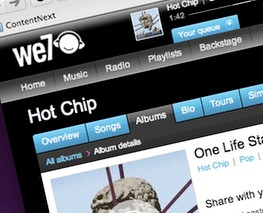
Spotify is trying to prioritise its paid service amid labels’ free reticence, Last.fm is ditching expensive full-track streams – but We7 says it just hit its first ever month where advertising income alone covered all of its free-play music royalty outgoings.
Some labels have recently expressed suspicion toward ad-funded music services, while WMG’s CEO in particular has said they’re “not a positive thing” and he won’t be licensing them in future.
Like the other services which, in the last year, have watched the growing suspicion and the flattening of online ads’ growth curve, We7 had hedged its bets by adding a premium subscription service, which is now required for using its smartphone app. It now has customers in the “low thousands”, but CEO Steve Purdham has since been sounding more convinced that ad-funded music can still work for both sides, when grown responsibly.
“This is like Roger Bannister breaking the four-minute mile,” Purdham told paidContent:UK. “A barrier which stood for what seemed forever and people thought was impossible, but it was proven it could be done.” He said it wasn’t the result of unusually high ad rates during the month in question, but wouldn’t disclose figures.
Frankly, the money we’re talking about is small – the whole ad-supported free music service market generated only £8.2 million for the UK music business in 2009, according to BPI figures out Monday. That’s 247 percent more up on 2008, but still only 4.3 percent of online music income, which is mostly still a la carte downloads.
We7 has had to experiment with its commercial model since launching a couple of years ago to offer ads embedded inside free downloads. It now carries both banner and audio ads against a web streaming service, with separate paid downloads.
On-demand music royalties commanded by PRS For Music alone are £0.00085 per track. “One million plays of a song on We7 would generate a range of payments to the music industry of between £2,000 to £4,000,” Purdham says, adding We7 streams “many , many, millions of streams per week”.
The implication of Purdham’s announcement, of course, is to tout We7’s credentials as an ad opportunity. He calls out iMeem, SpiralFrog, iLike, Lala and Ruckus in particular, saying: “(They have) ignored the crucial economics of the ad-funded market and gone for scale, subsequently getting consumed by other companies or getting lost altogether.”
He neglects to mention the gorilla in the room, Spotify, which is more opaque about its numbers. Spotify SVP Paul Brown said in January “there